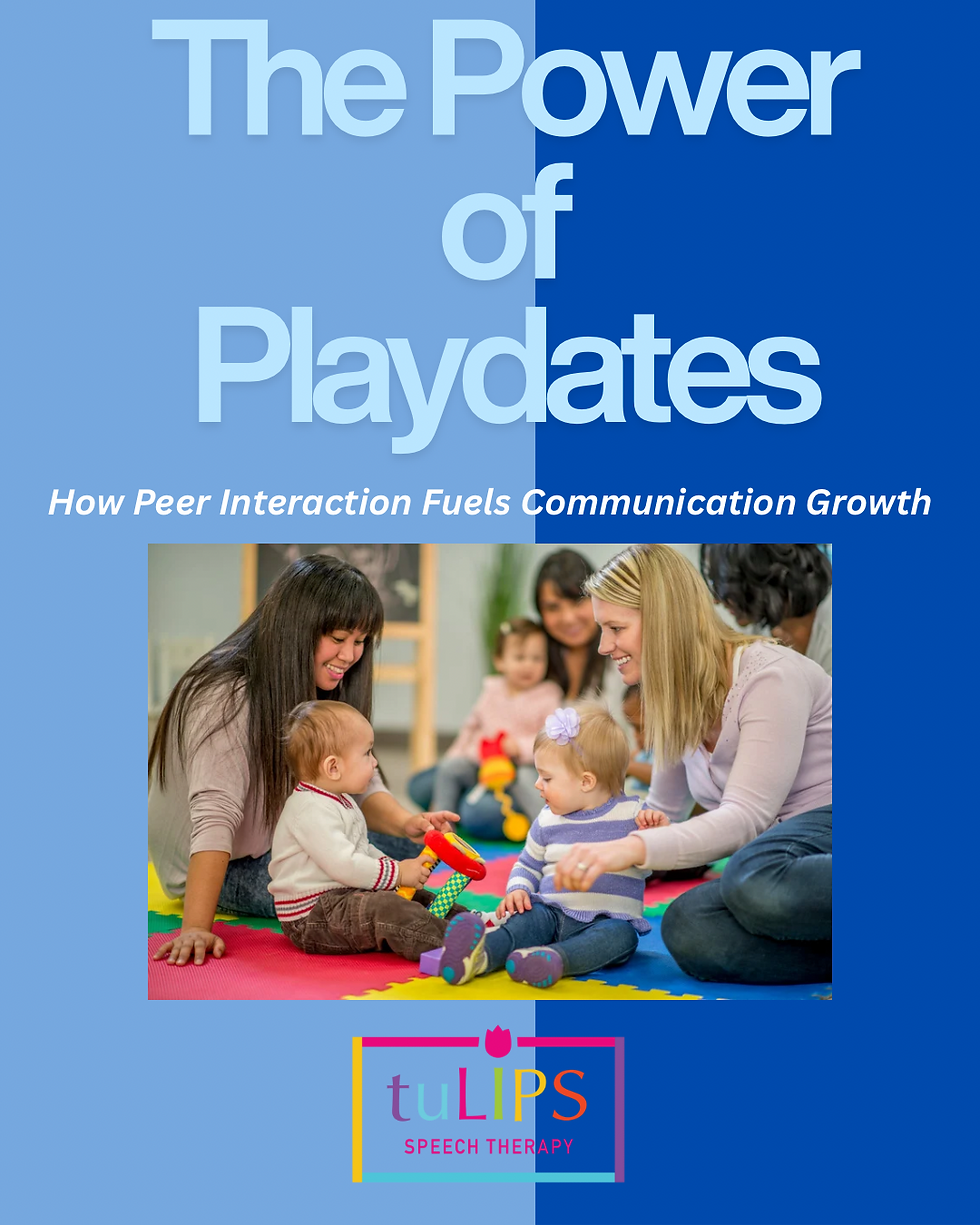The Power of Playdates: How Peer Interaction Fuels Communication Growth
- Rachel Verducci
- Nov 16, 2025
- 3 min read

Playdates are more than just fun—they’re one of the most powerful tools for language learning and social growth. When children interact with peers, they naturally practice communication, problem-solving, turn-taking, and empathy in ways that structured lessons can’t always replicate.
Speech-language pathologists often emphasize peer interaction as an essential part of developing strong communication skills. Research shows that children learn new words and conversational patterns more effectively from social engagement with peers than from adult-directed instruction (Brownell, 2011; Tomasello, 2003).
Whether your child is outgoing or shy, peer play provides endless opportunities to strengthen both speech and social confidence.
Why Peer Interaction Matters for Language Development:
1. Motivation to Communicate: Kids are naturally motivated to talk when play depends on collaboration—“Your turn!” “Let’s build!” “You be the teacher!”
2. Modeling & Imitation: Children learn by observing and copying peers’ speech, gestures, and social cues.
3. Vocabulary Growth: Play introduces new words in meaningful, context-rich environments.
4. Conversation Practice: Turn-taking, negotiating, and storytelling all strengthen pragmatic (social) language skills.
5. Confidence Building: Peer play allows children to use communication for connection rather than correction—boosting self-esteem and resilience.
According to the Social Learning Theory, children acquire new behaviors through observation and imitation, especially when peers model desired skills (Bandura, 1977). This principle applies directly to language learning and communication.
How Speech Therapy Encourages Peer Interaction
At tuLIPS Speech Therapy, we often incorporate peer-based and small-group sessions to help children practice language in real-world settings. These sessions focus on:
• Pragmatic Skills: Understanding body language, tone, and facial expressions.
• Perspective-Taking: Seeing a situation from another child’s point of view.
• Emotional Regulation: Managing big feelings in social situations.
• Collaborative Problem-Solving: Using words to express needs and resolve conflicts.
When children practice these skills with supportive peers, they develop flexibility and empathy—two cornerstones of meaningful communication.
Tips for Parents to Encourage Social Communication
• Host Short, Structured Playdates: Start with 30–45 minutes and plan simple cooperative activities (building, pretend play, crafts).
• Model Social Language: Use phrases like “Can I play too?” or “Let’s take turns” to demonstrate communication scripts.
• Observe, Don’t Overcorrect: Let children navigate small conflicts to build independence.
• Include Variety: Mix playdates with peers who have different personalities, strengths, and communication styles.
• Reflect Afterwards: Talk about what went well and how it felt to share, take turns, or use words to solve problems.
These guided experiences can make a big difference in social comfort and language confidence.
Playdates aren’t just for fun—they’re a language laboratory where real communication happens. Through laughter, creativity, and connection, children build the foundations of conversation, empathy, and self-expression that last a lifetime.
At tuLIPS Speech Therapy, we encourage families to view social play as part of the therapy process—because when children connect, they communicate.
Works Cited:
• Bandura, A. (1977). Social Learning Theory. Prentice-Hall.
• Brownell, C. A. (2011). Early developments in joint action. Review of Philosophy and Psychology, 2(2), 193–211.
• Tomasello, M. (2003). Constructing a Language: A Usage-Based Theory of Language Acquisition. Harvard University Press.

How do playdates help toddlers talk more? Learn how peer interaction builds vocabulary, turn-taking, confidence, and communication skills through play-based learning. Perfect for parents of late talkers!
playdates and speech development, peer interaction for toddlers, how playdates improve communication, social skills for late talkers, turn-taking practice for toddlers, play-based speech therapy, speech therapy for kids, toddler vocabulary building, communication growth through play, TuLIPS Speech Therapy, peer modeling for language development, social communication milestones, SLP strategies for group play, early intervention social skills, inclusive speech therapy, neurodiversity affirming SLP, toddler play and learning, parent support for speech delays, communication activities for toddlers, group speech therapy activities, talk to thrive tulips, toddler confidence building, shared play language development, therapy works speech therapy, child development and play, preschool social communication skills, how to support communication at home, toddler playdate ideas for speech, social communication development, speech therapy tips for parents
speech therapy for kids, playdate benefits for communication, peer interaction for language development, toddler social skills, turn-taking practice, communication matters, TuLIPS Speech Therapy, child development and play, speech pathology strategies, play-based learning, early intervention support, speech therapy for toddlers, social modeling for language growth, building confidence in young children, neurodiversity-affirming therapy, inclusive therapy practices, parent education for speech development, toddler communication tips, therapy for kids, supporting every voice, speech therapy resources for parents, how play supports speech, toddler communication milestones, social communication skills, play and learn activities, speech therapy guidance, communication growth through play
.png)




Comments